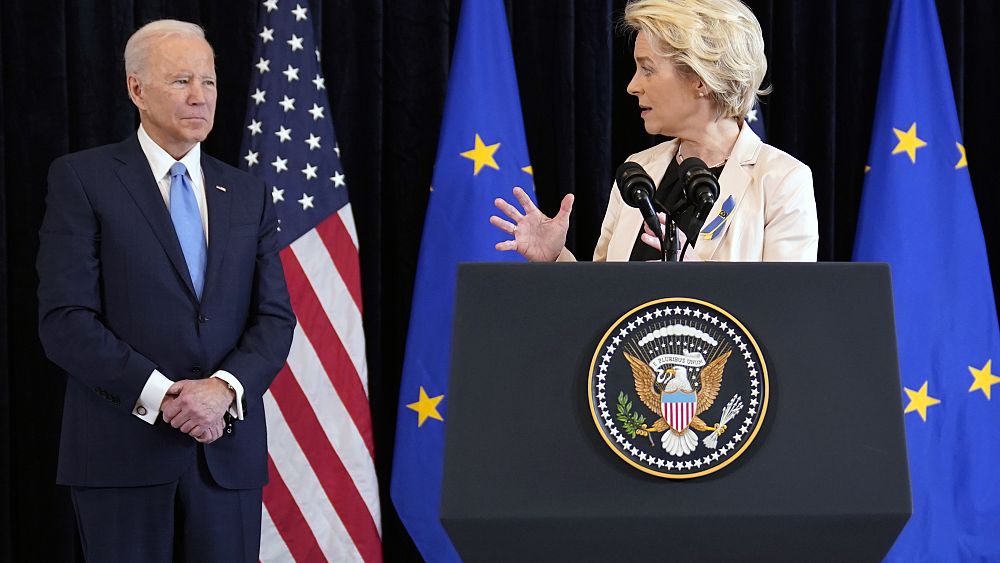
European Commission President, Ursula von der Leyen, and European Council President, Charles Michel, were supposed to be meeting US President Joe Biden for what looked like a routine trip to deal with outstanding trade issues, among other things.
But the war between Israel and Hamas is threatening to overshadow the summit, particularly after a week of confused communications from the EU, which saw contradictory messages coming out of the EU’s executive.
The topic is not officially up for discussion, but many in Brussels cannot see why it would not be.
“I think that this topic cannot not be in some way on the agenda,” Greek MEP Anna-Michelle Assimakopoulou told Euronews.
Brussels and Washington will certainly be looking to reaffirm their support for Israel, but are also likely to urge it to act in line with international humanitarian law in its retaliation against Hamas in the Gaza Strip, after previously being criticised for not doing so before.
Steel deal close, with China firmly in sight
Even if the conflict in the Middle East dominates discussions, it does not hide the fact that the EU and US still have a lot on their own plates.
Steel and aluminium are key to this, with the issue ongoing since the Trump era, after the erstwhile president slapped tariffs on European exports of the two metals.
The tariffs have since been suspended, but a final deal is yet to be reached.
The two sides could announce an interim agreement that would prevent the re-imposition of the levies from 2024, but a full agreement is unlikely, given that the policy interferes with Europe’s Carbon Border Adjustment Mechanism – a tax on carbon-intensive products imported by the EU.
China is also in their sights though, when it comes to steel.
In what looks like a double-pronged attack against Beijing, the EU is expected to announce both an anti-subsidy investigation into Chinese steelmakers and an agreement with the US to curb the export of Chinese metals.
“We basically have this sort of old trade dispute from the Trump era, where Trump put in place these tariffs on European steel and aluminium that were suspended a while ago, but they’re only suspended,” Jacob Kirkegaard, a senior fellow at the German Marshall Fund of the United States told Euronews.
“They’re coming back into force. So you would want a permanent solution to that.”
“What the solution that is being negotiated now is a so-called carbon club or an agreement between the EU and the United States to basically promote the production of sustainable sort of decarbonised steel and put tariffs on countries that don’t produce in a decarbonised way, a.k.a., of course, China.”
Both Brussels and Washington accuse Beijing of flooding the world market with cheap steel, so this is, in part, a way to deal with this problem.
“This is an attempt to address this long-standing issue of Chinese oversupply of steel to the global market. So you’re sort of trying to address different political problems in a transatlantic way,” Kirkegaard said.
“But I think most importantly, you are trying to sort of come to a modus operandi or a type of solution that, which may be useful in the future, because what I think we’re looking at in many of the sort of green industries, electric vehicles, solar panels, etc., are very large amounts of Chinese oversupply similar to the last 20 years in the steel industry.
“And the US and the EU are going to have to find a way to deal with that in a common way.”
Discussing other ways to reign in China will certainly be a key part of discussions, including EU export controls on advanced technologies, something the US has already implemented.
Critical raw materials agreement also close
EU officials have also told Euronews they are closing in on a deal on critical raw materials – minerals used in the production of batteries for electric vehicles, as well as a market that Beijing dominates.
This would allow European car makers to benefit from any US subsidies granted under Biden’s so-called Inflation Reduction Act, in this case designed to promote the use of American-made electric vehicles.
Agathe Demarais, a senior policy fellow at the European Council on Foreign Relations (ECFR), told Euronews that
“Both sides could agree not to impose trade tariffs or quotas on some of the critical raw materials that are commonly found in green energy products,” Demarais said.
“However, a transatlantic deal on critical raw materials will do nothing to curb China’s global domination in the field. As a result, EU-made EV batteries that will become eligible for some IRA-related tax credits will still be built using Chinese raw materials.
“In other words, a US-EU free-trade agreement on critical raw materials is moot by design – both sides are not key players in the field.”





